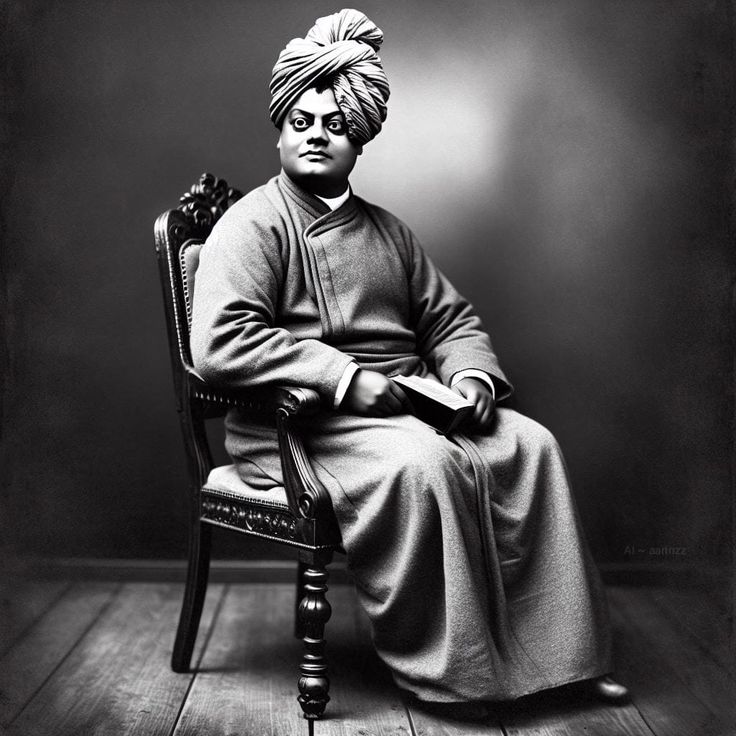Swami Vivekananda: The Inspirational Philosopher Who Transformed India and the World
Swami Vivekananda, one of India’s most influential spiritual leaders and philosophers, played a pivotal role in the revival of Hinduism and in shaping the spiritual consciousness of India during the late 19th century. His teachings not only inspired millions of people in India but also left a lasting impact on the world, helping to bridge the gap between Eastern and Western spiritual thought. Swami Vivekananda’s life and works have transcended time and continue to be a source of motivation for those who seek knowledge, self-improvement, and peace.
Early Life and Background
Swami Vivekananda was born as Narendranath Datta on January 12, 1863, in Kolkata, India, into a family of intellectuals. His father was a well-known lawyer, and his mother was deeply religious. From a young age, Vivekananda showed a keen interest in philosophy, spirituality, and rational thinking. His inquisitive nature led him to explore different religious teachings, and he was deeply influenced by the teachings of his spiritual guru, Ramakrishna Paramahamsa.
In his youth, Vivekananda was not only known for his academic brilliance but also for his deep sense of discipline and determination. His early education included subjects like history, philosophy, and literature. However, it was during his meeting with Ramakrishna that he found his true calling. Ramakrishna’s teachings deeply influenced Vivekananda, and under his guidance, Vivekananda embarked on a spiritual journey that would later make him a renowned figure worldwide.
Spiritual Journey and Mission
Swami Vivekananda’s life mission was to serve humanity and spread the message of self-realization, spirituality, and national pride. He believed that the true essence of religion was not in rituals but in selfless service, devotion to humanity, and the realization of the divine within. He emphasized the importance of understanding one’s own potential and striving to achieve greatness through inner strength.
In 1893, Vivekananda represented India at the World Parliament of Religions in Chicago, where his iconic speech on tolerance, universal brotherhood, and the need for interfaith dialogue gained worldwide recognition. His powerful words – “You, the Hindu, the Buddhist, the Christian, the Jew, the Muslim – you all are children of the same God” – struck a chord with the audience and brought India’s spiritual philosophy to the forefront of global discourse.
After returning to India, Swami Vivekananda focused on the upliftment of the poor and downtrodden. He founded the Ramakrishna Mission, which aimed to provide education, healthcare, and social services to the masses. Through the Ramakrishna Mission, Vivekananda worked to promote the idea of social equality, national rejuvenation, and self-reliance.
Daily Life and Work Ethic
Swami led a life of simplicity, discipline, and focus. Despite his global fame, he lived modestly and spent most of his time engaged in spiritual practices, meditation, and writing. His daily routine involved early morning meditation, study of ancient texts, and discussions on philosophy and spirituality with his disciples.
Vivekananda’s approach to life was practical and action-oriented. He believed that true spirituality could be achieved through the integration of physical, mental, and spiritual well-being. He emphasized the importance of regular exercise, self-discipline, and a balanced lifestyle. Swami Vivekananda’s emphasis on practical spirituality made his teachings relatable to people from all walks of life.
Impact and Significance on Society
Swami teachings brought forth the idea of a harmonious society, where individuals work together for the greater good of humanity. He urged people to realize their inner potential and take responsibility for their actions, focusing on both personal development and societal progress.
His call for national renewal inspired many Indian leaders, including Mahatma Gandhi, who was influenced by Vivekananda’s philosophy of self-reliance and service to humanity. Vivekananda’s ideas contributed significantly to the freedom struggle, as he instilled a sense of pride and self-worth in the hearts of millions of Indians who were under British colonial rule.
His teachings on education were revolutionary. He believed that education was the key to empowering individuals and uplifting society. He promoted a holistic approach to education, combining intellectual growth with moral, spiritual, and physical development. Swami Vivekananda’s vision of education was centered on the development of character, and he worked tirelessly to establish educational institutions that would nurture the next generation of leaders.
Observance and Legacy
In India, January 12, Swami Vivekananda’s birth anniversary, is celebrated as National Youth Day. The day is observed to inspire young people to follow the path of selfless service and personal excellence. Numerous institutions, organizations, and educational bodies honor his teachings by organizing events, lectures, and discussions on his philosophy.
Swami Vivekananda’s influence extends beyond India. His message of spirituality, universal love, and tolerance resonated deeply with people around the world. He became a symbol of Eastern wisdom and spiritual strength, bridging the gap between the East and the West. Today, his teachings continue to guide individuals, especially the youth, in their quest for knowledge, self-improvement, and service to society.
Important Points
- Swami is credited with introducing Hindu philosophy and spirituality to the Western world.
- He is the founder of the Ramakrishna Mission, an organization dedicated to the welfare of society.
- It’s famous speech at the 1893 World Parliament of Religions in Chicago emphasized universal brotherhood and tolerance.
- He was a champion of education, especially for women and the marginalized sections of society.
- It’s teachings on self-realization, strength, and national pride have inspired generations of people worldwide.
Frequently Asked Questions (FAQs)
- What was Swami Vivekananda’s most famous speech?
- Swami Vivekananda’s most famous speech was delivered at the 1893 World Parliament of Religions in Chicago, where he spoke about the universal principles of religion and called for interfaith harmony.
- What was the main philosophy of Swami Vivekananda?
- Swami Vivekananda’s philosophy was based on the idea of realizing one’s divine potential, serving humanity selflessly, and combining physical, mental, and spiritual development.
- How did Swami Vivekananda influence India’s independence movement?
- Swami Vivekananda’s teachings on national pride, self-reliance, and the importance of spiritual strength inspired many leaders, including Mahatma Gandhi, and contributed to the Indian freedom struggle.
- Why is January 12 celebrated as National Youth Day?
- January 12, Swami Vivekananda’s birthday, is celebrated as National Youth Day in India to honor his contributions to the upliftment of youth and society.
Conclusion and Wishing
Swami life and teachings continue to serve as a beacon of inspiration for people around the world. His message of strength, self-realization, and service to humanity transcends borders and cultures, reminding us of the power within each of us to bring about positive change. As we reflect on his contributions, let us all strive to embody his ideals in our own lives, working towards a society that is compassionate, strong, and united in its diversity. Swami Vivekananda’s legacy is not just about philosophy; it is about living a life of purpose and serving humanity with integrity and love.










